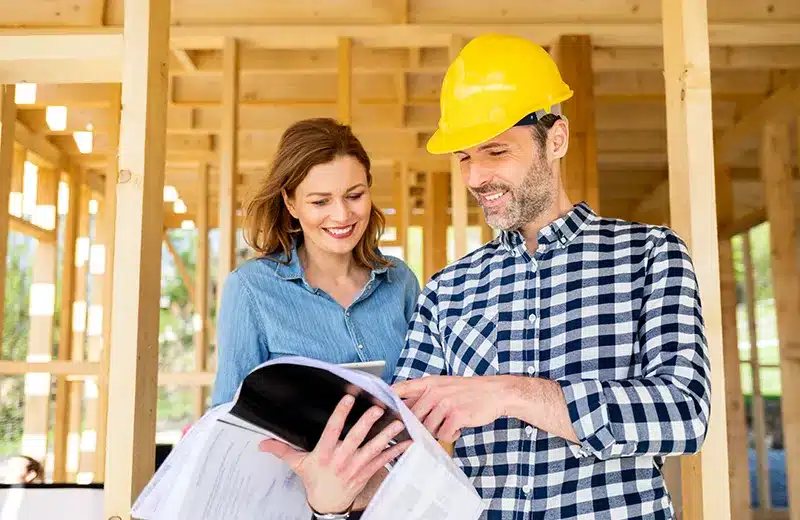Questions to Ask a Builder When Renovating in Minnesota
When renovating your home, it’s essential to vet potential builders by asking specific questions about how they do business. Not all builders have the same experience or work standards, so asking about their qualifications, past projects, and timelines will help you choose someone who aligns with your vision and budget. By knowing which questions to ask a builder when renovating, you can also avoid potential pitfalls like miscommunication or unexpected expenses.
Lumber One has served Minnesota with exceptional home remodeling contractor services since 1962. Here are what we know to be the most important questions to ask a builder when renovating:

1. Can You Provide References from Past Clients?
Asking for references is one of the most effective ways to assess a builder’s track record. Speaking with past clients gives you insight into how well the builder meets deadlines, stays within budget, and communicates throughout the project. You’ll also get a feel for their workmanship and reliability. Good builders should be eager to share references because satisfied clients are their best advocates. If they hesitate, that’s a red flag.
Key takeaway: Learn about a builder’s expertise, quality of work, and ability to stick to a schedule and budget.
2. Are You Licensed and Insured?
Licensing shows that the builder can legally perform construction work in your area. It indicates that they follow industry qualification standards for safety and quality. Insurance is equally important because it protects you from liability if there’s an accident or if your property is damaged during the project. If something goes wrong and your builder doesn’t have the proper licensing and insurance, you – the homeowner – could face serious legal and financial risks.
Key takeaway: Confirm the builder has liability insurance and worker’s compensation coverage.
3. What is Your Experience with Similar Renovation Projects?
Every renovation is unique. You want a builder who has successfully completed similar projects in the past so you feel confident in their ability to tackle yours. A builder experienced in comparable projects will be better equipped to anticipate challenges, suggest practical solutions, and deliver a result that aligns with your vision. For example, suppose you’re renovating a bathroom in an older home and want to preserve elements of traditional charm. In that case, you’ll want to seek a builder who is proficient in updating bathrooms and preserving historic elements.
Key takeaway: Look for experience in the same type of project (bathroom, kitchen, addition, etc.), your desired materials, and aesthetic goals.

4. Can You Provide a Detailed Estimate and Timeline?
A well-prepared builder should be able to give you an estimate outlining the cost of materials, labor, and additional expenses like equipment rental, testing, inspections, etc. With this clarity, you can budget properly and avoid large, unexpected charges. A timeline is equally important because it sets expectations for how long each project phase will take. Overall, a detailed estimate will help keep everyone on track and accountable.
Key takeaway: Ensure the estimate includes labor, materials, and potential contingencies.
5. How Do You Handle Changes or Unexpected Issues?
Renovations rarely go exactly as planned. Sometimes builders discover hidden structural issues, materials might be on backorder or discontinued, a storm can roll in on the day they planned to knock down an exterior wall – or maybe you change your mind about a design element!
Changes and unexpected issues can be easy to navigate if you choose a builder who communicates quickly and honestly, maintains a positive attitude while adapting, and comes prepared to navigate modifications.
Key takeaway: Ask about their process for change orders and how they plan to communicate about issues.
6. Who Will Be Managing the Project Daily?
The person you speak to during the vetting process might not be the one managing day-to-day operations on the project site. Whoever will be your main point of contact should be someone with experience, authority, and strong communication skills. Ideally, they’ll be able to quickly and thoroughly answer your questions, provide updates, and resolve issues.
Key takeaway: Clarify who will manage the project, how often they’ll be on-site, and the best way to communicate with them.

7. How Do You Communicate with Clients Throughout the Project?
As a client, you should know how you’ll receive information – whether through phone calls, email, or in person – and how often. When discussing this, you should also cover which decisions you want to be involved with and which your builder can take the lead on. A builder who prioritizes communication is more likely to deliver a project that meets your expectations with few misunderstandings or surprises.
Key takeaway: Ask the builder if they use a project management system you can access or if/how they’ll provide you with regular reports.
8. What is the Payment Schedule?
Payment schedules should clearly outline what’s due and when. Typically, you’ll pay a portion upfront, with subsequent payments tied to milestones in the project. This way, you don’t have to pay the total amount just to get started, and the builder has enough funds to keep the project moving. Both parties will have a much easier time managing the budget with a fair and agreed-upon payment schedule.
Key takeaway: Look for milestone-based payments rather than paying upfront.
9. Do You Offer a Warranty on Your Work?
A warranty is a sign that the builder stands behind their work. If something goes wrong after the project is completed, like a structural issue or material defect, they’ll return to fix it without charging you more money. A warranty also shows that the builder is confident in their craftsmanship and the quality of materials they use.
Key takeaway: Ask if the builder offers a warranty and what it covers.
10. What is Your Process for Ensuring Quality Control?
A strong quality control process might involve regular inspections, using trusted subcontractors, and sticking to best practices for materials and construction techniques. When you ask about quality control measures, it reinforces the fact that you have a lot invested in the outcome and expect your builders to hold themselves to a high standard. On the builder’s end, it demonstrates a commitment to integrity.
Key takeaway: Ask how they choose subcontractors, inspect completed work, and give their stamp of approval.
The Lumber One Experience
These ten questions to ask a builder when renovating are crucial for assessing experience, reliability, and communication skills. Take your time to vet potential builders so you can feel confident they will deliver high-quality work on time and within budget.
At Lumber One, we pride ourselves on our thorough and transparent process. From detailed estimates and timelines to maintaining open communication throughout the project, we are dedicated to creating a positive experience for every customer.
If you’re planning a renovation, contact Lumber One – a builder you can trust to bring your vision to life.
